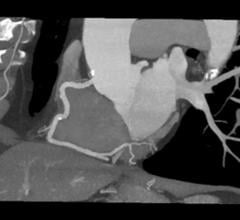A recent study conducted by Olive AI explores how hospital leaders are responding to the imperative to drive efficiency and reduce costs through strategic investments in non-clinical technologies. The study audits the state of adoption and investment in artificial intelligence (AI) and robotic process automation (RPA).
The Radiological Society of North America (RSNA) and the American College of Radiology (ACR) will launch a new medical 3-D printing clinical data registry to collect 3-D printing data at the point of clinical care. A joint ACR-RSNA committee will govern the registry, intended to pilot in the fall of 2019.

This is a photo essay of the cardiovascular CT technologies on the expo floor and discussed in sessions at the 2019 ...
Providing exceptional cardiovascular care for patients to achieve the best possible outcomes is the number one goal for ...
Corindus Vascular Robotics announced it has entered into a definitive merger agreement to be acquired by Siemens Healthineers AG. Under the terms of the merger agreement, Siemens Medical Solutions, a wholly-owned subsidiary of Siemens Healthineers AG, a German stock listed company, will acquire all issued and outstanding shares of common stock of Corindus for $4.28 per share in cash, representing an aggregate purchase price of approximately $1.1 billion.
This is a quick video example of a cardiac computed tomography (CT) exam showing a Medtronic CoreValve transcatheter ...
This is an example of an automated calcium scoring software to speed review of coronary artery calcium (CAC) scoring ...
Cardiac positron emission tomography (PET) is growing in popularity among cardiologists because it provides the ability ...
Cerner has announced the development of the Cerner Learning Health Network to help clinicians more easily and efficiently gain health insights and guide care. Cerner aims to automate data collection from multiple sources, including the electronic health record (EHR), to rapidly give medical researchers access to important information that has the potential to transform patient care. Through combined technology and expertise, Cerner and the Duke Clinical Research Institute (DCRI) have joined together to pilot the Cerner Learning Health Network and innovate clinical research registries in the process.
Hormone replacement therapy is a common treatment for menopause-related symptoms, and new research from the University of Pittsburgh Graduate School of Public Health reinforces the importance of tailoring hormone therapy to each patient, based on her individual risk factors for cardiovascular disease.
This is an example of in-stent restenosis shown using spectral CT imaging. This example was demonstrated by Philips ...
When performing radiofrequency (RF) ablation to treat cardiac arrhythmia, medical professionals must balance the safety ...
Heart failure is the fourth most common cause for all admission to U.S. hospitals, and it is the most common reason for ordering an inpatient transthoracic echocardiogram (TTE). Research presented at the 30th Annual American Society of Echocardiography (ASE) Scientific Sessions shows patients who received an echocardiogram with contrast were less likely to require repeat tests and had shorter hospitalizations overall. This study shows the value of contrast (ultrasound enhancing agent/UEA) for improving clinical care and potentially decreasing healthcare costs.
Blood pressure monitoring might one day become as easy as taking a video selfie, according to new research in Circulation: Cardiovascular Imaging, an American Heart Association journal.

There were several interesting new trends in cardiovascular computed tomography (CT) imaging at the 2019 Society of ...
Change Healthcare Cardiology Hemodynamics is an integrated hemodynamic monitoring system for monitoring vital signs and ...
Cardiovascular Systems Inc. (CSI) has acquired the Wirion Embolic Protection System and related assets from Gardia Medical Ltd., a wholly owned Israeli subsidiary of Allium Medical Solutions Ltd.
When used with a common heart scan, machine learning, a type of artificial intelligence (AI), does better than conventional risk models at predicting heart attacks and other cardiac events, according to a study published in the journal Radiology.
A West Virginia-based rural medical outreach event showcased the use of point-of-care technology in an ambulatory setting and demonstrated that it can enhance clinical decision making. Physicians used new digital health technologies to diagnose acute and chronic cardiovascular diseases in a resource-limited area, and found that it improved their ability to diagnose common cardiac conditions such as atrial fibrillation and heart failure. Research findings on how this technology-based care impacts provider referral and downstream testing were presented during the 30th Annual American Society of Echocardiography (ASE) Scientific Sessions, June 21-25 in Portland, Ore.


 August 08, 2019
August 08, 2019















